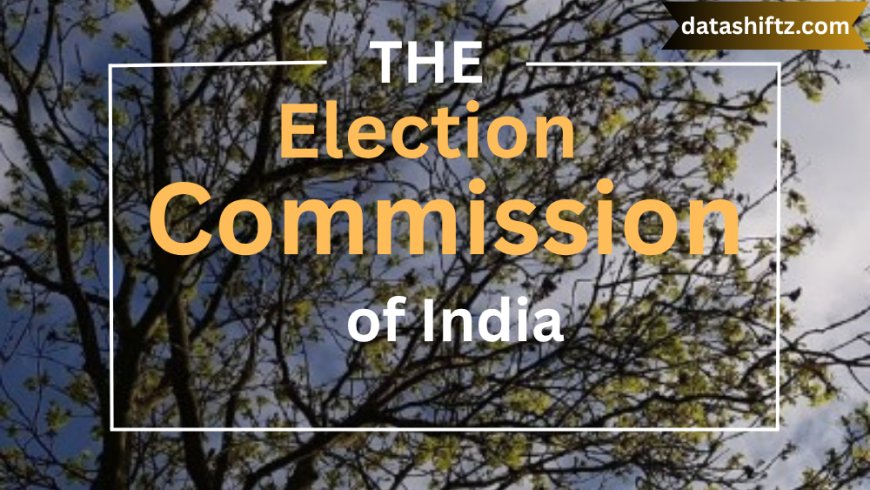Election Commission of India: Guiding India’s Democratic Journey

Introduction
Established under Article 324 of the Indian Constitution in 1950, the Election Commission of India (ECI) is a powerful constitutional body entrusted with conducting all free, fair, and credible elections in India—spanning Lok Sabha, State Assemblies, and the offices of the President and Vice-President . Today, in 2025, under the leadership of Chief Election Commissioner (CEC) Gyanesh Kumar and Election Commissioners Sukhbir Singh Sandhu and Vivek Joshi, the ECI has initiated transformative reforms—from digitising voter lists to boosting turnout—while navigating political scrutiny. Let’s dive into how the ECI is steering Indian democracy in the new era.
Structure & Leadership of the ECI
Constitutional Role & Current Composition
-
Chief Election Commissioner: Gyanesh Kumar (since February 19, 2025)
-
Election Commissioners: Sukhbir Singh Sandhu and Vivek Joshi
According to the 2023 Appointments Act, commissioners serve a single maximum term of 6 years or until age 65—whichever comes first
Core Responsibilities
-
Oversee elections for Parliament, state assemblies, and key national offices
-
Maintain clean electoral rolls
-
Ensure compliance with the Model Code of Conduct (MCC)
-
Monitor political financing, election expenditure, party symbols, and candidate eligibility
-
Leverage technology for transparency, data accuracy, and voter accessibility
Recent Reforms & Technological Advances
Cleaning the Voter Rolls
In 2025, the ECI introduced a major reform—automatic deletion of deceased voter entries by integrating with the Registrar General of India’s death records While experts highlight potential data gaps, the ECI maintains that field verification by BLOs remains mandatory
Additionally, around 2.6 lakh duplicate voter IDs were eliminated, with affected voters awarded new IDs
Faster Voter ID Issuance
A new SOP ensures EPICs (voter ID cards) are delivered within 15 days of any update—significantly speeding up the voter registration process
Poll-Day Webcasting & Turnout Tech
-
Webcasting is now deployed at all polling stations, improving transparency
-
The ECI now uses app-based turnout data, delivering near real-time updates to the public every two hours
Voter Accessibility & Capacity-Building
Booth Reforms & Voter Inclusion
| Initiative | Details |
|---|---|
| Polling Station Capacity | Capped at 1,200 electors to reduce crowding |
| Proximity Goal | No voter travels more than 2 km to vote |
| Urban Booth Expansion | New booths in gated communities & high rises |
Training the Electorate Managers
-
Over 3,500 BLOs/Supervisors trained via IIIDEM
-
Planned expansion to train over 100,000 supervisors and 1 million electoral staff
-
1 crore election officials (including polling staff) to receive digital training
Party Engagement & Complaint Mechanisms
-
Over 4,700 all-party meetings at various administrative levels to foster dialogue
-
Political parties now receive training on civic processes (nomination, MCC, etc.)
-
A 15-day turnaround policy implemented for handling grievances, supported by transparent digital tools
Broader Reform Agenda – ECINET & Electoral Integrity
ECINET – The Unified Platform
The ECI developed ECINET, a single‑window dashboard that merges over 40 apps and websites—including voter registration, candidate info, election dashboards, grievances, turnout updates, and webcasting. Partial launch started in June 2025 in bye-elections, full rollout scheduled ahead of Bihar Assembly polls
Structural & Institutional Reforms
-
A new appointing collegium for CEC selection (PM + CJI + LoP) to enhance institutional autonomy
-
AI-driven cleansing for duplicate EPICs & ghost voters, linked with UIDAI and RGI data
-
Trials for blockchain‑based VVPAT verification and Totaliser machines are underway to boost ballot integrity
Challenges & Criticisms
Concerns Over Bias
During the Kaliganj by-poll, TMC accused the ECI of bias—alleging that a BJP-aligned firm won a polling webcasting contract unfairly
Execution Hurdles
-
Dependence on electronic death records—often incomplete—underscores the need for physical verification
-
Urban voter turnout remains a concern despite special measures
What Lies Ahead – Roadmap for Change
Upcoming ECI Initiatives
-
Full deployment of ECINET by late 2025
-
Geographic expansion of webcasts, blockchain verification, and totaliser machines
-
Trials of digital voter slips and biometric EPIC–Aadhaar integration
-
Continued engagement with stakeholders and swift grievance responses
-
Advanced capacity-building across ERO/BLO cadres
-
Monitoring the impact of invite-only candidate debates and stricter political funding disclosure limits
Conclusion
As India’s democracy expands in scope and scale, the Election Commission of India is at the forefront of ensuring smooth elections. Its technology-driven reforms, voter-centred practices, and institutional introspection mark a promising era under CEC Gyanesh Kumar. Whether confronting political controversy or refining administrative systems, the ECI remains vital to upholding electoral integrity in a vibrant democracy. The success of upcoming elections—especially the Bihar polls—will hinge on how effectively these reforms take root.




























